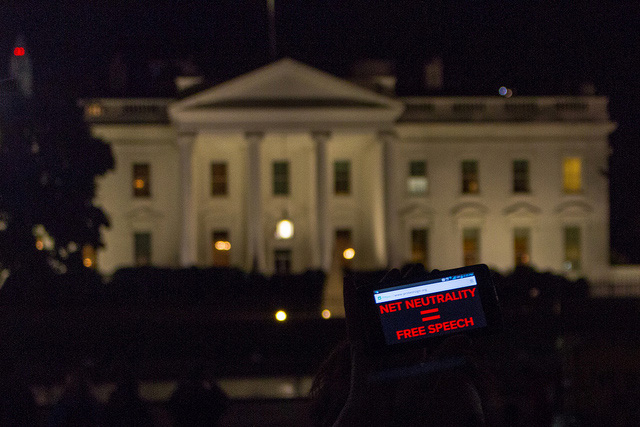
Part of the Series
Moyers and Company
Did you know that Truthout is a nonprofit and independently funded by readers like you? If you value what we do, please support our work with a donation.
Back in 2006, Democrat Ed Markey, then a congressman and now a senator from Massachusetts, introduced an amendment to protect net neutrality, the dull name for the important idea that all internet traffic be treated equally by internet service providers. This legislation, it turned out, was a cash cow for Congress.
Large telecommunication companies wanted to prevent Markey’s protections from being put in place, since it would constrain their business. Companies like Google and Netflix, on the other hand, wanted to make sure the protections were put in place, since they would protect their business. Without net neutrality protections, the telecommunication companies could regulate how quickly sites like Google and Netflix loaded for their customers — or whether their customers were able to access the sites at all.
A new report from the Roosevelt Institute, a progressive think tank, uses the battle that unfolded over this 2006 legislation to illustrate a larger point: That with enough money, companies can buy legislators’ votes.
To see more stories like this, visit Moyers & Company at Truthout.
In this example, of course, party played a big role in how members of Congress voted: Democrats largely supported net neutrality, Republicans largely didn’t. The partisan split remains today. But money also played a determining role, the Roosevelt Institute’s researchers found. For every $1,000 given by a company like Netflix or Google, the likelihood that a member of Congress would vote for the legislation increased by 24 percent. For every $1,000 given by companies that opposed net neutrality, the chances that a legislator would vote against the legislation increased by 2.6 percent.
The amendment failed, though President Barack Obama’s Federal Communications Commission later secured net neutrality without Congress’ help. (It is, however, now under threat again by President Donald Trump’s FCC chair.)
The Roosevelt Institute study that came up with this cost-per-vote analysis is one of a kind. It’s very hard to track influence, and it only got more difficult to do so after 2010, when new species of nonprofit began to populate the political spending ecosystem in the wake of the Supreme Court’s Citizens United decision. Interconnected super PACs, LLCs, party-affiliated groups, think tanks and dark money nonprofits allowed donors to pass limitless and often anonymous sums through a financial labyrinth, making it near-impossible, in some cases, for journalists and citizens to track which special interest was influencing which vote.
But, in the new study, political scientists Thomas Ferguson and Paul Jorgensen and statistician Jie Chen have done the work to document how money influences Congress. The authors of this study attempted to take all of the post-Citizens United groups into account — candidate campaign committees, party committees, dark money groups, SuperPACs and others.
In addition to the 2006 vote on net neutrality, the researchers examined how members of Congress voted on the Dodd-Frank financial reforms, which passed Congress in 2010 and were meant to rein in some of the Wall Street excesses that contributed to the financial crisis.
The Democratic Party largely supported Dodd-Frank — some of its strictest provisions were the handiwork of progressive senators like Elizabeth Warren (D-MA) and Sherrod Brown (D-OH). But the researchers found that for every $100,000 a House Democrats received from the financial industry, the odds that the legislator in question would break with the party and oppose an aspect of Dodd-Frank increased by 13.9 percent.
The researchers also found that the temptation of a spin through the revolving door may have played a role in how members of Congress voted on Dodd-Frank. Legislators who left the House in 2014 were much more likely to side with the banks in their votes, because, the researchers suggest, they were considering where their future paychecks might come from.
“Taken as a whole, the pattern [the two case studies] display is too obvious to need much emphasis,” the researchers write. “Substantial numbers of legislators sell out the public interest in exchange for political money.”
Political money also ensures that the politicians favored by corporations have the money they need to campaign hard for reelection and hold onto their office, the researchers write. That may mean that those who retain their seats are more friendly to well-healed interests.
Because of the amount of money they have, and their willingness to spend it on political issues that could affect their bottom line, the telecommunications industry and the financial industry are two of the most influential constituencies in Washington — a fact demonstrated by the never-ending battles over financial regulation and net neutrality, both of which have lobbyists gearing up, once again, in an effort to push a new bushel of corporate favors through Congress and onto Trump’s desk in 2017.
Matching Opportunity Extended: Please support Truthout today!
Our end-of-year fundraiser is over, but our donation matching opportunity has been extended! All donations to Truthout will be matched dollar for dollar for a limited time.
Your one-time gift today will be matched immediately. Your monthly donation will be matched for the whole first year, doubling your impact.
This matching gift comes at a critical time. As Trump attempts to silence dissenting voices and oppositional nonprofits, reader support is our best defense against the right-wing agenda.
Help Truthout confront Trump’s fascism in 2026, and have your donation matched now!